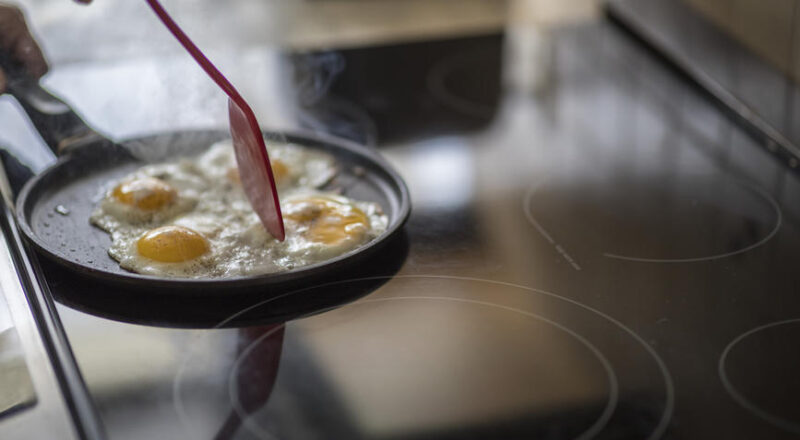In recent years, the popularity of induction cooking has surged, offering a modern alternative to traditional gas and electric stoves. However, with its rise in popularity comes questions, particularly about using heavy cookware on induction stovetops. Understanding how these elements interact can lead to more efficient, safe, and enjoyable cooking experiences. Let’s dive into the world of induction cooking and how it pairs with heavy cookware.

What is Induction Cooking?
Induction cooking relies on electromagnetic technology to heat cookware directly. Unlike traditional methods, which heat the burner, induction cooktops use magnetic fields to generate heat within the cookware itself. This method is not only faster but also more energy-efficient. To explore more about the mechanism, you can visit Wikipedia’s page on induction cooking.
The Science Behind Induction Cooktops
Induction cooktops work through an electromagnetic field beneath a ceramic plate. When a ferromagnetic pot is placed on the cooktop, the magnetic field induces many smaller electric currents within the pot’s metal. These currents make the metal heat up, which cooks the food. This method requires cookware with a ferrous metal base to be effective.
Importance of Cookware Material
The efficiency of using heavy cookware on induction largely depends on the material of the cookware. Common materials like cast iron and some stainless steel are ideal as they contain ferrous metals. Non-ferrous metals like aluminum or copper will not work unless they have a magnetic layer built into the base.
Cast Iron Cookware
Cast iron is a favorite among many cooks for its heat retention and durability. When it comes to using cast iron on induction, its ferrous nature makes it an ideal choice. However, the weight and thickness of cast iron mean it heats up slowly but retains heat well, making it perfect for slow cooking techniques. For more on the compatibility of cast iron with induction, check out this detailed guide.
Stainless Steel Cookware
Stainless steel is another excellent option. However, not all stainless steel cookware is created equal. You need to ensure that your stainless steel cookware has a magnetic layer. The quality of stainless steel largely determines its effectiveness and longevity on an induction cooktop.
Benefits of Using Heavy Cookware on Induction
While the weight of cookware doesn’t directly affect cooking on an induction stove, heavier cookware can offer certain benefits:
- Stability: Heavy cookware is less likely to move around, making it safer to use.
- Heat Retention: It retains heat longer, which can be beneficial for dishes that require consistent temperatures.
- Durability: Generally, heavier cookware is made from more durable materials.
Challenges of Using Heavy Cookware on Induction
Despite its benefits, there are challenges associated with using heavy cookware on induction:
- Weight: The sheer weight can be cumbersome, especially when handling large pots or pans.
- Scratches: Heavy cookware can scratch the glass surface of induction cooktops if not handled carefully.
Preventing Scratches on Induction Cooktops
To avoid scratches, it’s crucial to lift rather than drag heavy cookware. Also, ensuring the bottom of your cookware is clean and smooth can prevent unwanted marks. You might also consider placing a thin protective mat between the cooktop and the cookware.
Tips for Using Heavy Cookware on Induction
To make the most of your induction cooking experience with heavy cookware, consider the following tips:
- Preheat Gradually: Gradual heating can prevent thermal shock and improve cooking efficiency.
- Monitor Weight: Ensure your cooktop can handle the weight of your cookware, especially when filled with food.
- Use Appropriate Cookware: Always check if your cookware is compatible with induction cooking.
FAQs
Can I use any heavy cookware on induction cooktops?
No, not all heavy cookware is suitable. It must contain ferrous metal to work effectively on induction cooktops.
Will using heavy cookware damage my induction cooktop?
Using heavy cookware won’t necessarily damage your cooktop if handled properly. Always lift cookware when moving it and ensure the base is clean.
Is cast iron the best choice for induction cooking?
Cast iron is excellent for induction cooking due to its ferrous nature and heat retention. However, it is heavy and requires careful handling to avoid damaging the cooktop.

Conclusion
Understanding the dynamics of using heavy cookware on induction can significantly enhance your cooking experience. By choosing the right materials and handling them correctly, you can enjoy the benefits of both heavy cookware and induction cooking. For those interested in further reading, consider exploring the topic of cold spots in cast iron on induction to deepen your understanding of potential challenges.
This article contains affiliate links. We may earn a commission at no extra cost to you.

